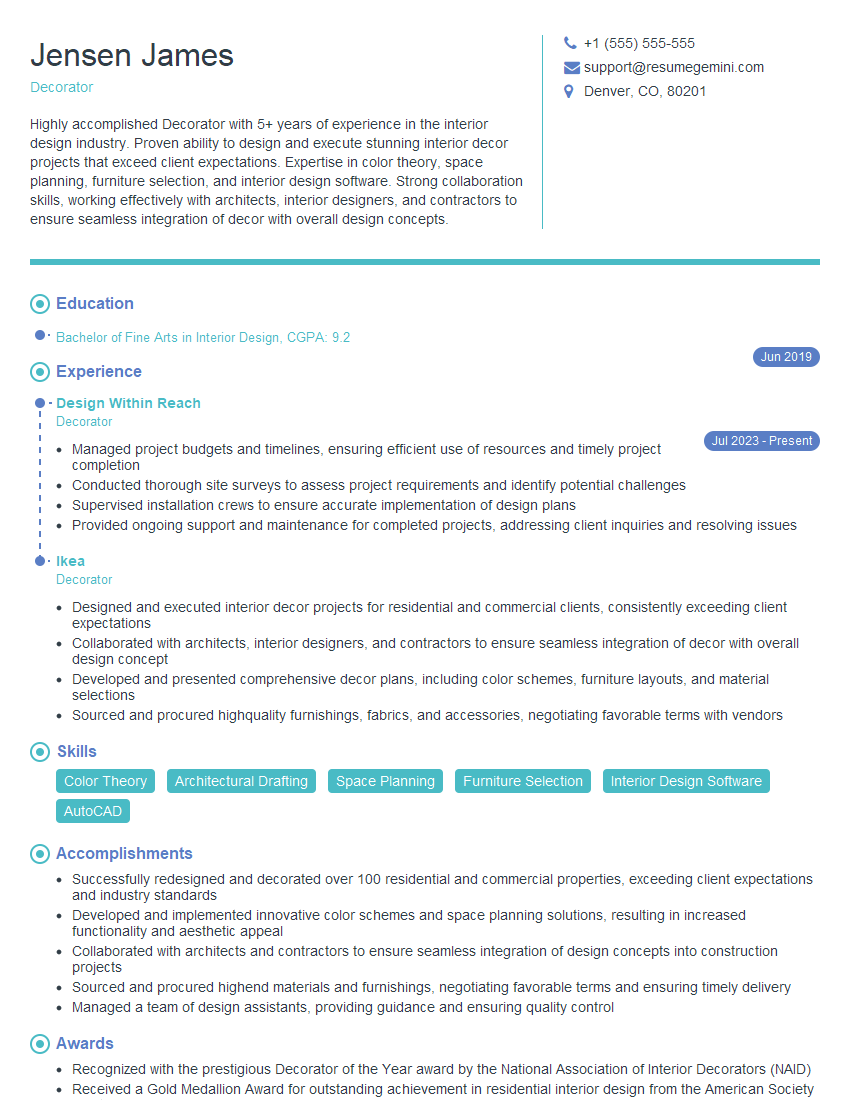Are you a seasoned Decorator seeking a new career path? Discover our professionally built Decorator Resume Template. This time-saving tool provides a solid foundation for your job search. Simply click “Edit Resume” to customize it with your unique experiences and achievements. Customize fonts and colors to match your personal style and increase your chances of landing your dream job. Explore more Resume Templates for additional options.

Jensen James
Decorator
Summary
Highly accomplished Decorator with 5+ years of experience in the interior design industry. Proven ability to design and execute stunning interior decor projects that exceed client expectations. Expertise in color theory, space planning, furniture selection, and interior design software. Strong collaboration skills, working effectively with architects, interior designers, and contractors to ensure seamless integration of decor with overall design concepts.
Education
Bachelor of Fine Arts in Interior Design
June 2019
Skills
- Color Theory
- Architectural Drafting
- Space Planning
- Furniture Selection
- Interior Design Software
- AutoCAD
Work Experience
Decorator
- Managed project budgets and timelines, ensuring efficient use of resources and timely project completion
- Conducted thorough site surveys to assess project requirements and identify potential challenges
- Supervised installation crews to ensure accurate implementation of design plans
- Provided ongoing support and maintenance for completed projects, addressing client inquiries and resolving issues
Decorator
- Designed and executed interior decor projects for residential and commercial clients, consistently exceeding client expectations
- Collaborated with architects, interior designers, and contractors to ensure seamless integration of decor with overall design concept
- Developed and presented comprehensive decor plans, including color schemes, furniture layouts, and material selections
- Sourced and procured highquality furnishings, fabrics, and accessories, negotiating favorable terms with vendors
Accomplishments
- Successfully redesigned and decorated over 100 residential and commercial properties, exceeding client expectations and industry standards
- Developed and implemented innovative color schemes and space planning solutions, resulting in increased functionality and aesthetic appeal
- Collaborated with architects and contractors to ensure seamless integration of design concepts into construction projects
- Sourced and procured highend materials and furnishings, negotiating favorable terms and ensuring timely delivery
- Managed a team of design assistants, providing guidance and ensuring quality control
Awards
- Recognized with the prestigious Decorator of the Year award by the National Association of Interior Decorators (NAID)
- Received a Gold Medallion Award for outstanding achievement in residential interior design from the American Society of Interior Designers (ASID)
- Honored with the Rising Star Award for emerging talent in interior design by the International Interior Design Association (IIDA)
- Won first place in the Best Decorated Room category at the annual Home Design Showcase
Certificates
- NCIDQ Certified Interior Designer
- LEED Green Associate
Career Expert Tips:
- Select the ideal resume template to showcase your professional experience effectively.
- Master the art of resume writing to highlight your unique qualifications and achievements.
- Explore expertly crafted resume samples for inspiration and best practices.
- Build your best resume for free this new year with ResumeGemini. Enjoy exclusive discounts on ATS optimized resume templates.
How To Write Resume For Decorator
- Quantify your accomplishments with specific metrics whenever possible.
- Use strong action verbs and avoid passive language.
- Tailor your resume to each job you apply for, highlighting the skills and experience most relevant to the position.
- Proofread your resume carefully for any errors in grammar, spelling, or punctuation.
Essential Experience Highlights for a Strong Decorator Resume
- Designed and implemented interior decor projects for residential and commercial clients, adhering to project requirements and exceeding client expectations.
- Collaborated with architects, interior designers, and contractors to ensure seamless integration of decor with overall design concepts.
- Developed and presented comprehensive decor plans, including color schemes, furniture layouts, and material selections.
- Sourced and procured high-quality furnishings, fabrics, and accessories, negotiating favorable terms with vendors.
- Managed project budgets and timelines, ensuring efficient use of resources and timely project completion.
- Conducted thorough site surveys to assess project requirements and identify potential challenges.
Frequently Asked Questions (FAQ’s) For Decorator
What is the role of a Decorator?
A Decorator is responsible for designing and executing interior decor projects for residential and commercial clients. They work closely with architects, interior designers, and contractors to ensure seamless integration of decor with overall design concepts.
What are the key skills required to be a successful Decorator?
Key skills for a Decorator include color theory, space planning, furniture selection, interior design software, and AutoCAD.
What is the career outlook for Decorators?
The career outlook for Decorators is expected to grow faster than average in the coming years. This is due to the increasing demand for interior design services as more and more people are investing in their homes and businesses.
What are the different types of Decorator jobs?
There are many different types of Decorator jobs, including residential decorators, commercial decorators, and event decorators. Residential decorators work with homeowners to design and decorate their homes. Commercial decorators work with businesses to design and decorate their offices, retail stores, and other commercial spaces. Event decorators work with event planners to design and decorate special events, such as weddings, parties, and conferences.
What is the average salary for a Decorator?
The average salary for a Decorator varies depending on their experience, location, and the type of work they do. However, according to the U.S. Bureau of Labor Statistics, the median annual salary for interior designers was $57,930 in May 2021.
What are the benefits of working as a Decorator?
There are many benefits to working as a Decorator, including the opportunity to be creative, the chance to work with a variety of clients, and the satisfaction of seeing your work come to life.